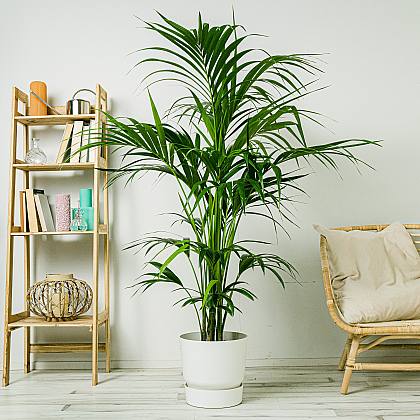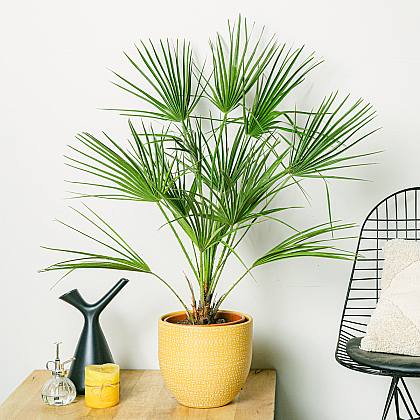Protect your houseplants with neem oil blend – goodbye pests!
Protecting our houseplants is something that fills us with satisfaction, right? But sometimes, pests can ruin our garden at home. But don't worry! We have the...
Protecting our houseplants is something that fills us with satisfaction, right? But sometimes, pests can ruin our garden at home. But don't worry! We have the perfect solution: neem oil. This powerful pest repellent is the key to keeping your plants free of undesirable insects. In this article, you'll find out how neem oil works, how to prepare an effective blend, and how to apply it correctly. Plus, you'll learn some tips and tricks to keep your houseplants healthy and happy. So get ready to say goodbye to pests and welcome them to an enviable garden!
The Power of Neem Oil in Houseplant Care
When it comes to caring for our beloved houseplants, neem oil comes in handy. This natural product has proven to be highly effective in protecting against the most common pests that affect our plants. Its ability to repel unwanted insects is impressive and allows us to keep our plants healthy and free from damage. Neem oil acts as a protective shield, creating a barrier that scares away insects and prevents them from feeding on our precious plants. In addition, its action is not limited to repelling, but also has insecticidal properties, which means that it can eliminate existing pests. This is especially useful when we encounter an infestation and need to act quickly to prevent further damage. Neem oil is easy to use and can be applied directly to the leaves and stems of our plants. Not only does it protect against pests, but it also promotes the healthy growth of our houseplants. Undoubtedly, neem oil is a true natural treasure that allows us to enjoy our plants without worries, goodbye to pests!
The Most Common Pests Affecting Houseplants
Houseplants are a beautiful addition to any home, but unfortunately, they can also be prone to pest damage. These little intruders can ruin the appearance and health of our favorite plants. Among the most common pests affecting houseplants are aphids, spider mites, and thrips. Aphids are small sucking insects that feed on plant sap, leaving behind yellowish, sticky leaves. On the other hand, spider mites are tiny creatures that hide in leaves and produce fine cobwebs, gradually weakening the plant. Finally, thrips are winged insects that feed on plant tissues, causing visible damage to leaves and flowers. These pests can spread quickly and wreak havoc on our beloved houseplants. But don't worry, there's a solution! With neem oil blend, you'll be able to protect your houseplants from these pesky pests and keep them healthy and beautiful.
What is neem oil and how does it work as a pest repellent?
Neem oil is a natural product that is obtained from the seeds of the neem tree, native to India. It is widely used as a pest repellent in houseplant care. But how exactly does it work? Neem oil contains compounds called azadirachtin and limonoids, both of which act as natural insecticides. These compounds affect the hormonal system of pests, preventing their reproduction and development. In addition, neem oil also has anti-food properties, which means that pests won't want to eat the leaves treated with this oil. This prevents them from feeding and damaging your plants.
Once applied, neem oil creates a protective layer over the leaves and stems of your plants, acting as a physical barrier against pests. At the same time, it also possesses fungicidal properties, which means it can help prevent fungal diseases in your plants.
Best of all, neem oil is safe for plants and does not cause harm to humans or pets. However, it is important to remember that it should be used with caution and following the manufacturer's instructions to avoid any potential risks.
In short, neem oil is a powerful ally in the fight against pests in your houseplants. Its ability to repel insects and prevent fungal diseases makes it an ideal choice for protecting your precious plants and keeping them healthy.
Preparing Neem Oil Blend to Protect Your Plants
Preparing the neem oil mixture to protect your houseplants is a simple and effective process. The first thing you need is to get pure neem oil, which you can find in specialty gardening stores or online. Once you have it, dilute a tablespoon of neem oil in a quart of warm water. Be sure to mix well so that the oil is evenly distributed in the water.
Once you've prepared the mixture, pour it into a spray bottle. This will allow you to easily mist the leaves and stems of your houseplants. Remember that it's important to cover both the tops and bottoms of the leaves, as many pests hide underneath.
It is advisable to apply this mixture every two weeks to keep pests away. If you already have an infestation, you can increase the frequency to once a week until they are completely gone.
Additionally, it is important to note that neem oil not only acts as a pest repellent, but also has fungicidal and bactericidal properties. This means that it can also help prevent disease in your plants.
Remember that while neem oil is safe for plants and humans, it's important to follow the manufacturer's instructions and not exceed the recommended dosage. Always test a small part of the plant before applying it completely, to make sure there aren't any negative reactions.
With this simple neem oil blend, you'll be able to protect your houseplants and keep them healthy and pest-free!
Proper application of neem oil on your houseplants
When it comes to protecting your houseplants with neem oil blend, it's crucial to make sure you apply it properly. The right application ensures that pests are effectively repelled and that your plants are protected from potential damage. To start, dilute the neem oil in water according to the manufacturer's instructions. Then, fill a spray bottle with the mixture and generously spray all parts of the plant, including the leaves, stems, and flowers. Be sure to cover both the tops and bottoms of the leaves, as many pests hide at the bottom. It is important to apply neem oil on a day without direct sun to avoid burning the leaves. Also, avoid spraying too close to the flowers so as not to interfere with pollination. Repeat this application every two weeks or as needed, especially if you notice signs of infestation. Don't worry if you notice a slight smell after applying the oil, it will disappear quickly. Remember that neem oil is a natural and safe way to protect your houseplants from pesky pests. Don't hesitate to give it a try and you'll see how your plants bloom without any worries!
Additional Benefits of Neem Oil for Plant Growth and Health
Not only is neem oil effective as a pest repellent, but it also has additional benefits for houseplant growth and health. This wonderful natural product is rich in essential nutrients such as nitrogen, phosphorus and potassium, which are essential for plant development. These nutrients promote vigorous and healthy growth, strengthening its roots and increasing its resistance to disease and adverse conditions.
In addition, neem oil has antifungal properties, which means it can prevent and treat fungal infections in plants. This is especially beneficial for houseplants, which are often exposed to moist environments and prone to fungal development.
Another important benefit of neem oil is its ability to improve soil quality. When applied regularly, this oil acts as an organic fertilizer, improving soil structure and promoting nutrient retention. This helps the plants better absorb the available nutrients and provides them with a favorable environment for their growth.
In short, neem oil not only protects our houseplants against pests, but also promotes their growth and overall health. With its essential nutrients, antifungal properties, and ability to improve soil quality, this natural product is a great choice for keeping our plants healthy and beautiful. Don't hesitate to give it a try!
Tips and tricks to keep your houseplants healthy and pest-free
To keep your houseplants healthy and pest-free, here are some tips and tricks that will go a long way. First, it's important to make sure you're providing the right environment for your plants. This involves placing them in a place with the right amount of sunlight and temperature, avoiding drafts and sudden changes in temperature. Also, make sure to water them properly, avoiding both over- and underwatering.
Another important tip is to keep your plants clean. Regularly remove dead or damaged leaves, as they can become a breeding ground for pests. You can also use a damp cloth to wipe away the dust that accumulates on the leaves, which will help prevent the appearance of insects.
In addition, it is advisable to use organic fertilizer to strengthen the natural defenses of your plants. This will provide them with the nutrients needed to grow healthy and strong, making them less likely to be attacked by pests.
If, despite all your efforts, pests appear on your plants, don't despair. There are natural methods to combat them without harming your plants or the environment. For example, you can prepare a mixture of water and neutral soap to spray on the affected leaves. You can also use sticky traps or even introduce beneficial insects like ladybugs or predatory mites.
Remember that prevention is key to keeping your plants healthy and pest-free. Regularly monitor your plants for signs of infestation and act quickly if you spot any problems. With these tips and tricks, you'll be able to enjoy beautiful houseplants without worrying about the nuisance caused by pests.
Protecting our houseplants is critical to keeping them healthy and beautiful. Neem oil is presented as a natural and effective solution to repel pests that can affect our beloved plants. With its powerful insecticidal power, neem oil acts as a protective shield, keeping unwanted intruders away. In addition, its preparation and application are simple, making it an accessible option for all plant lovers. Not only that, neem oil also has additional benefits for plant growth and health. Now that you know about this wonderful blend, I encourage you to try it and experience for yourself its incredible results. Give your plants the care they deserve and say goodbye to pests! And remember, there are always new ways to protect and care for our plants, so keep researching and discovering more tips and tricks to keep your houseplants healthy and happy


